Hiring a Tableau Developer can be a game-changer for your business, turning complex data into actionable insights and helping you make data-driven decisions. Often, companies struggle to find the right fit because they underestimate the specific skill set and experience required to excel in this role. It's not just about finding someone who knows Tableau, but someone who can apply their analytical skills to drive real business value.
In this article, we provide a comprehensive guide on what to look for when hiring a Tableau Developer. We cover everything from crafting a job description to conducting interviews and assessments. To ensure you find top talent, check out our skills assessment tools.
Table of contents
Why Hire a Tableau Developer?
Hiring a Tableau Developer can help your organization transform raw data into actionable insights. These professionals excel at creating interactive dashboards and visualizations that make complex data easy to understand and analyze.
A skilled Tableau Developer can address various business challenges, such as:
- Improving sales forecasting accuracy
- Identifying customer trends and behaviors
- Optimizing supply chain operations
Before hiring a full-time Tableau Developer, consider your data volume and complexity. For smaller projects or to test the waters, you might start with a consultant or work with a service provider. As your data needs grow, bringing a dedicated Tableau Developer on board can provide long-term value and data-driven decision-making capabilities.
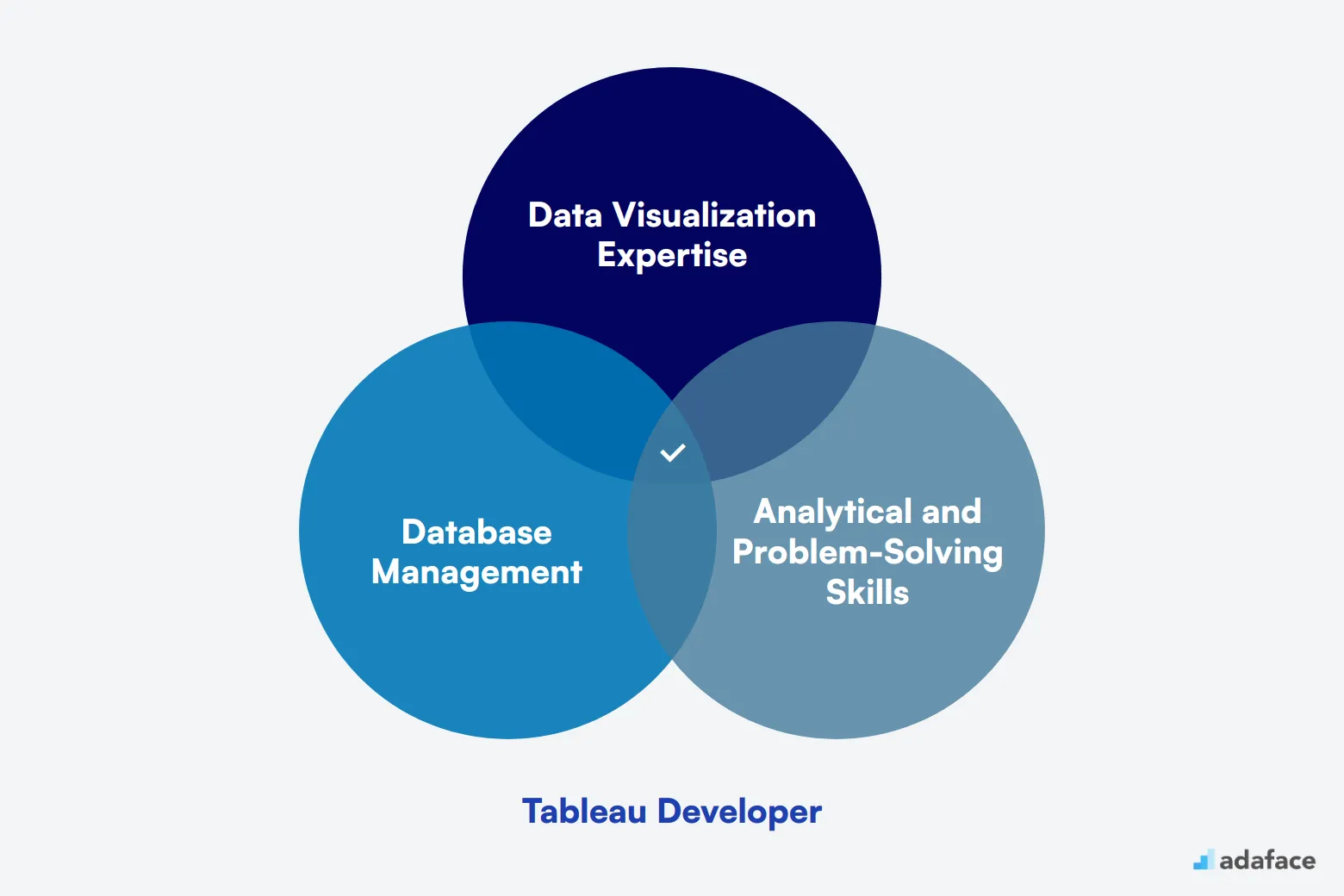
Tableau Developer Hiring Process
Hiring a Tableau Developer can be a straightforward process if you plan it well. The entire hiring process can take about 1-2 months, depending on your approach and speed.
- Crafting the Job Description: Start with a clear and detailed Tableau Developer job description. Post it on platforms where data professionals are actively seeking opportunities.
- Resume Screening: Gather resumes and short-list candidates based on their experience and skills in data visualization and Tableau.
- Skill Assessment: Use role-specific tests or case studies to evaluate candidates' technical skills. These assessments can give you insights into their problem-solving abilities and proficiency with Tableau.
- Interview Process: Conduct interviews to assess both technical and cultural fit. This stage may include technical interviews, HR interviews, and team fit assessments.
- Offer and Onboarding: Once you've identified the best candidate, proceed to make an offer. A well-planned onboarding process ensures your new hire starts on a strong note.
In summary, a well-structured process helps in finding the right Tableau Developer efficiently. You'll begin with a comprehensive job description, followed by thorough skill and fit assessments, leading up to interviews and onboarding. We will explore each of these steps in more detail to ensure a seamless hiring experience.
Key skills and qualifications for a Tableau Developer
When creating a candidate profile for a Tableau Developer, it's important to distinguish between must-have skills and nice-to-have qualities. This helps focus your search and ensures you don't miss out on potential great hires. Let's break down the essential skills for a Tableau Developer into required and preferred categories.
Required skills and qualifications:
- Three or more years of Tableau development experience
- Proficiency in data visualization techniques
- Strong analytical and problem-solving abilities
- Experience with SQL and database management tools
- Excellent communication and teamwork skills
Preferred skills and qualifications:
- Experience with Tableau Server administration
- Knowledge of other BI tools like Power BI or Qlik
- Background in finance, marketing, or operations
- Experience with scripting languages such as R or Python
- Familiarity with agile development processes
| Required skills and qualifications | Preferred skills and qualifications |
|---|---|
| Three or more years of experience in Tableau development | Experience with Tableau Server administration |
| Proficient in data visualization techniques | Knowledge of other BI tools like Power BI or Qlik |
| Strong analytical and problem-solving skills | Background in finance, marketing, or operations |
| Experience with SQL and other database management tools | Experience with scripting languages such as R or Python |
| Excellent communication and collaboration skills | Familiarity with agile development processes |
How to write a Tableau Developer job description?
Once you have a clear candidate profile ready, the next step is to capture that information in a job description to attract the right candidates. A well-crafted job description will not only outline what you are looking for but also engage potential applicants by providing insights into the role and your organization.
• Highlight key responsibilities and impact: Clearly define the tasks the Tableau Developer will handle, such as creating dashboards and visualizations. Emphasising how their work will contribute to data-driven decision-making will attract candidates motivated by meaningful contributions.
• Balance technical skills with soft skills: While it's important to list technical expertise like proficiency in Tableau and SQL, don't forget to mention soft skills such as analytical thinking and effective communication. This balance helps in attracting candidates who can not only handle data but also collaborate effectively with teams.
• Showcase your company's unique selling points: Share what makes your company and this role stand out—be it innovative projects, a thriving work culture, or growth opportunities. Such details can entice top talent who are looking for more than just a job.
For a detailed reference, consider reviewing the Tableau Developer job description to ensure you cover all important aspects.
Top Platforms to Hire Tableau Developers
Now that you have a clear job description for a Tableau Developer, it's time to list the position on various job listing sites to source suitable candidates. Leveraging these platforms can significantly increase your chances of finding qualified professionals who meet your needs.
LinkedIn Jobs
Ideal for posting full-time Tableau Developer positions. Offers extensive reach and allows detailed job descriptions with company profiles. Useful for attracting experienced professionals.

Indeed
Versatile platform suitable for posting full-time, part-time, and contract Tableau Developer roles. Offers wide visibility and easy application process for candidates.

Dice
Specialized job board for tech roles. Excellent for targeting Tableau Developers with specific technical skills and experience. Attracts tech-savvy candidates.
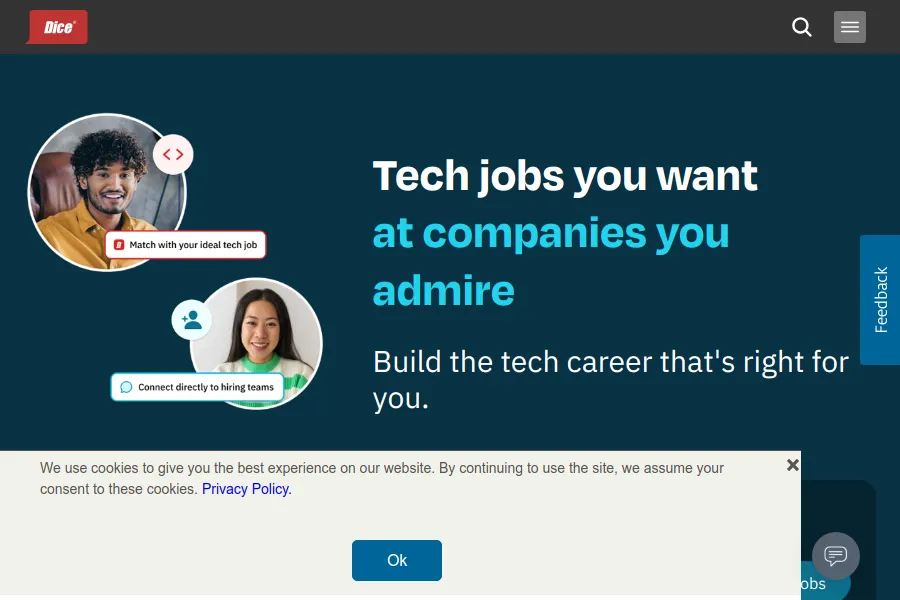
A few of the most effective platforms include LinkedIn Jobs, which is ideal for full-time positions and offers extensive reach, and Indeed, a versatile site suitable for any type of job. Additionally, Dice is a tech-focused job board that specifically targets candidates with the right technical skills. As you explore further, consider platforms like Upwork for freelance opportunities, Toptal for elite talent, and Stack Overflow for engaging with passionate developers.
Keywords to Look for in Tableau Developer Resumes
Resume screening is a key step in finding the right Tableau Developer. It helps you quickly identify candidates with the most relevant skills and experience before moving to interviews.
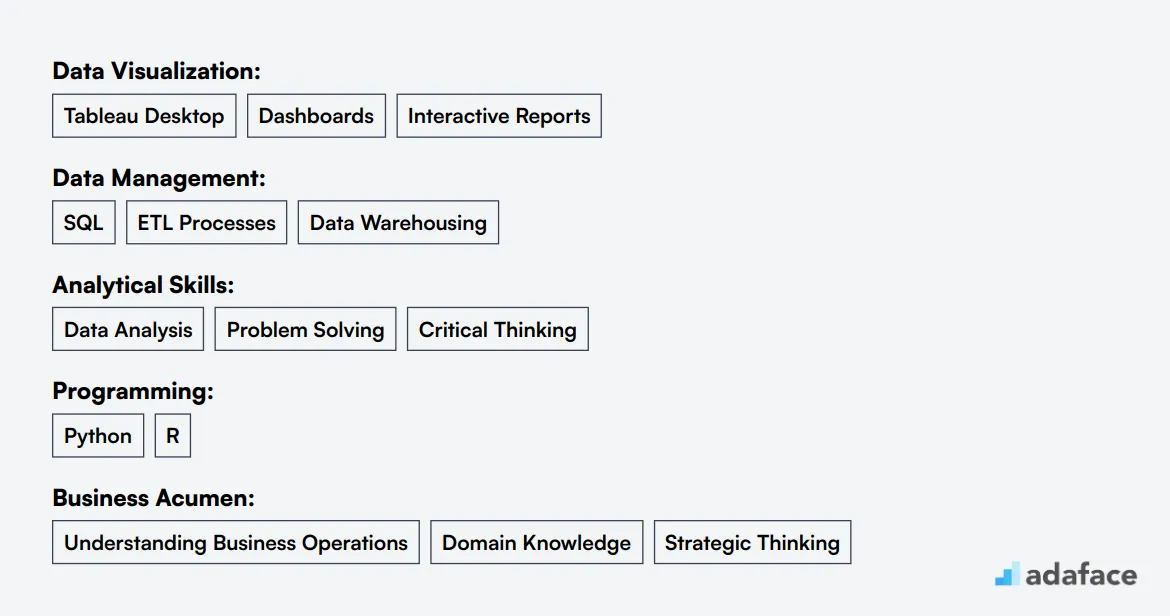
When manually screening resumes, focus on key technical skills like Tableau, SQL, and data visualization. Look for experience with data warehousing and ETL processes. Pay attention to analytical abilities and domain knowledge in areas like finance or marketing.
AI tools can speed up resume screening for Tableau Developers. You can use ChatGPT or similar AI to scan resumes for specific keywords and skills, helping you shortlist candidates more quickly.
Here's a sample prompt for AI-assisted resume screening:
TASK: Screen resumes for Tableau Developer role
INPUT: Resumes
OUTPUT:
- Email
- Name
- Matching keywords
- Score (0-10)
- Recommendation
- Shortlist (Yes/No/Maybe)
KEYWORDS:
- Tableau (Desktop, Server, Dashboards)
- SQL
- Data Visualization
- ETL
- Analytics
- Python or R
Customize this prompt with your specific job requirements for best results.
Recommended skills tests for assessing Tableau Developers
Skills tests are an effective way to evaluate Tableau Developer candidates beyond their resumes. They provide objective insights into a candidate's abilities and help you make informed hiring decisions. Here are the top tests we recommend for assessing Tableau Developers:
Tableau skills test: This Tableau online test evaluates a candidate's proficiency in creating visualizations, dashboards, and stories using Tableau. It assesses their ability to work with data sources, perform calculations, and design interactive reports.
SQL skills test: Tableau developers often need to write custom SQL queries to extract and manipulate data. An SQL online test can help you assess a candidate's ability to write complex queries, join tables, and optimize database performance.
Data Modeling skills test: A data modeling test evaluates a candidate's ability to design efficient data structures for analysis. This skill is important for Tableau developers who need to organize and optimize data for visualization.
Data Analysis skills test: The data analysis test assesses a candidate's ability to interpret data, identify patterns, and draw meaningful insights. These skills are crucial for Tableau developers to create impactful visualizations and reports.
Data Storytelling skills test: Effective Tableau developers need to communicate insights clearly. A data storytelling test evaluates a candidate's ability to present data in a compelling narrative, which is essential for creating persuasive dashboards and presentations.
How to structure interview stage for hiring Tableau Developers
After candidates successfully pass the skills tests, it's crucial to move them to the technical interview stage to further assess their hard skills. While skills tests are great for filtering out those who might not fit the role, interviews help in identifying the best candidates. In technical interviews, you can gauge their capabilities and dive deeper into their experiences with tools like Tableau.
Here are some example interview questions to consider for this role: 1) Can you explain your process for developing a Tableau dashboard? This helps understand their practical approach and experience with the tool. 2) How do you handle large datasets in Tableau? This question gauges their ability to manage big data. 3) Describe a challenging project you've worked on using Tableau. This can reveal their problem-solving skills. 4) What are some advanced features in Tableau you frequently use? Their familiarity with advanced features indicates depth of experience. 5) How do you ensure data accuracy and integrity in your visualizations? Understanding their approach to data quality is fundamental. Learn more about Tableau Developer interview questions.
How much does it cost to hire a Tableau Developer?
Hiring a Tableau Developer can vary significantly in cost depending on location and experience. In the United States, salaries typically range from $80,000 to $150,000 per year, with a median around $110,000. Australian developers earn between $101,652 AUD and $145,168 AUD, while in Canada, the range is approximately $54,358 CAD to $104,293 CAD. These variations mean it's important to consider local market conditions when budgeting for this role.
Tableau Developer Salary in the United States
The average salary for Tableau Developers in the United States ranges from $80,000 to $150,000 per year. The median salary stands at around $110,000, with variations based on factors like location, experience, and company size.
Top-paying cities for Tableau Developers include Washington, DC, with a median salary of $105,000, and Cincinnati, OH, at $94,000. Other tech hubs like Austin, Dallas, and New York offer competitive salaries in the $85,000 to $88,000 range.
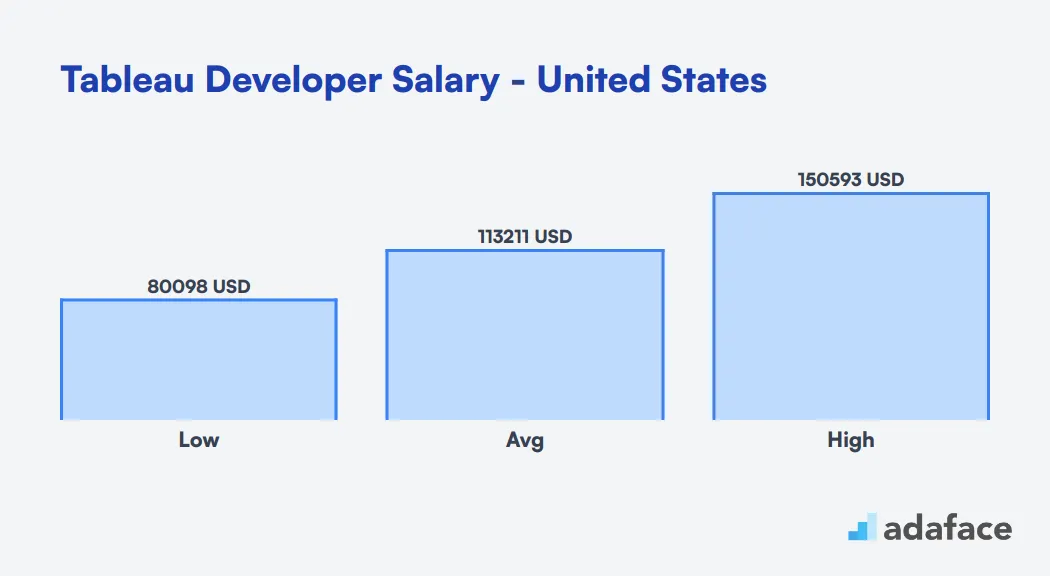
Tableau Developer Salary in Australia
In Australia, the average salary for a Tableau Developer is approximately $122,657 AUD. Salaries can vary significantly based on experience and location, with entry-level positions starting around $101,652 AUD and more experienced developers earning up to $145,168 AUD. In Sydney, for instance, the average salary is slightly higher at about $124,695 AUD.
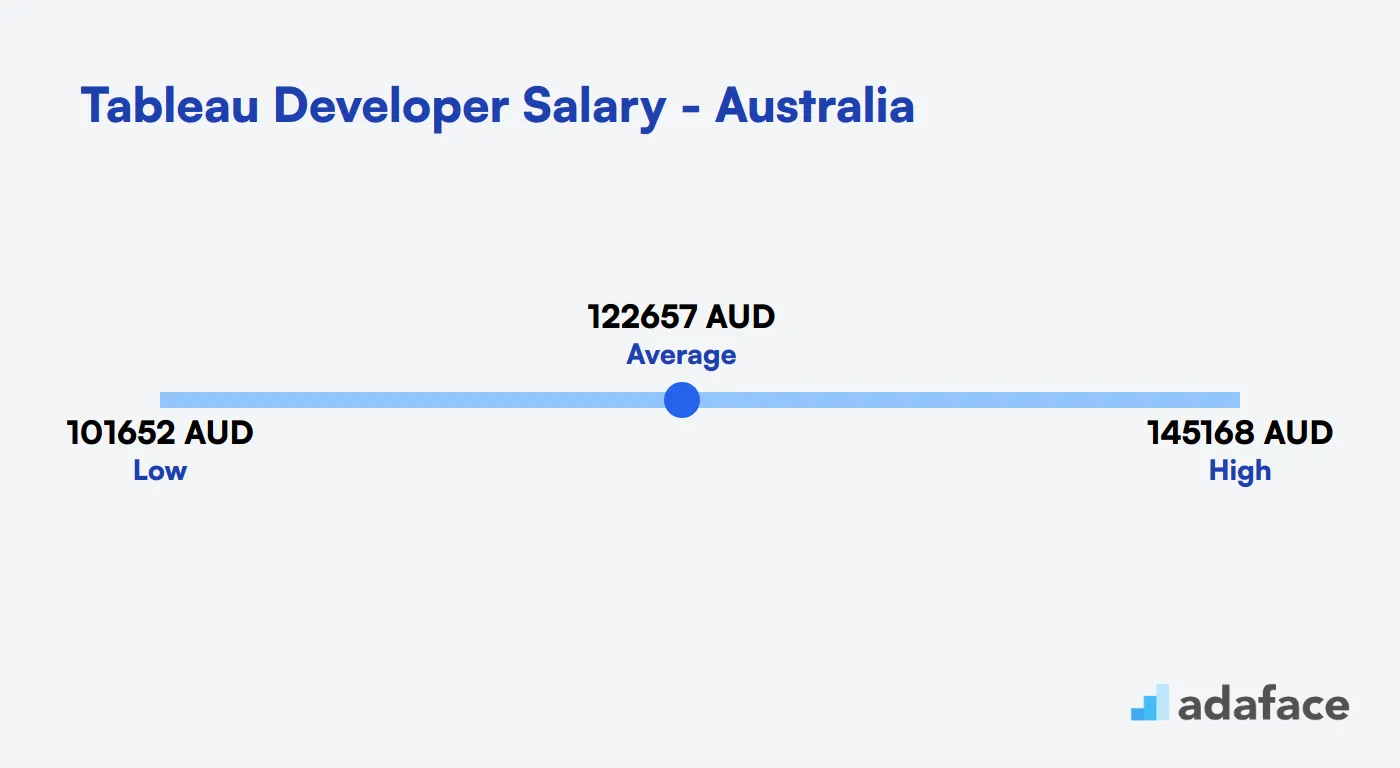
Tableau Developer Salary in Canada
The average salary for a Tableau Developer in Canada is approximately $77,766 CAD. Salaries can range from a minimum of $54,358 CAD to a maximum of $104,293 CAD. These figures vary based on location, with cities like Mississauga and Toronto offering different salary averages due to local demand and cost of living. It's important for recruiters to consider these variations when setting salary expectations.
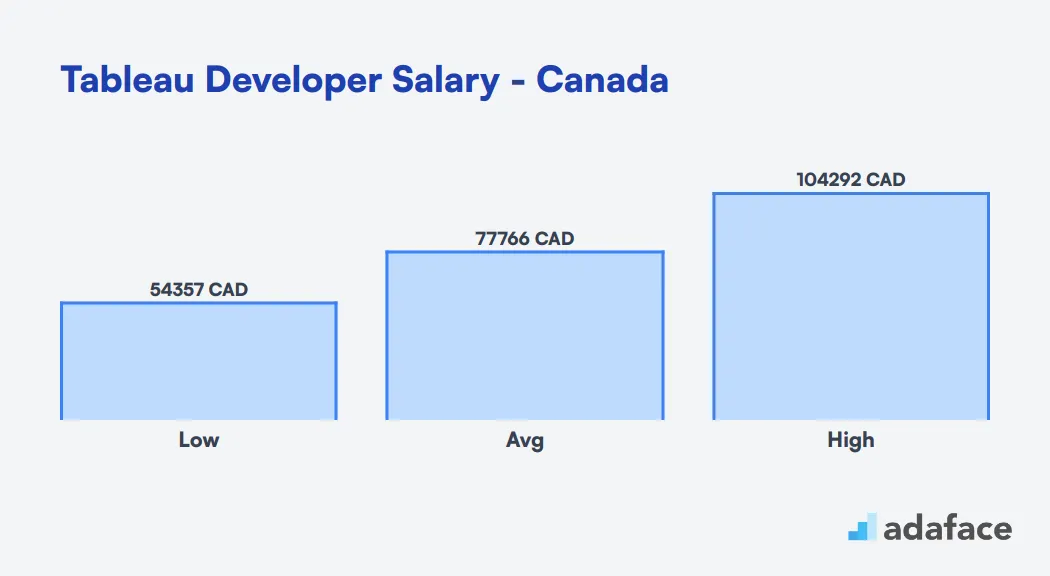
What's the difference between a Tableau Developer and a Tableau Consultant?
It's easy to confuse a Tableau Developer with a Tableau Consultant as both work with the same tool but have different roles. The distinction mainly lies in the scope and focus of their work, which can sometimes blur depending on the project needs.
A Tableau Developer is primarily focused on building and maintaining dashboards. Their skill set includes working with Tableau Desktop, Server, and Prep, often within in-house IT departments. They handle specific visualization tasks and have moderate business acumen with limited client interaction. Their career progression could lead to becoming a Senior Developer or Team Lead.
On the other hand, a Tableau Consultant provides strategic data solutions and client advisory services. They not only use the full Tableau suite but also bring in data integration tools. Their role demands high business acumen and extensive client interaction, often working within consulting firms or as freelancers. They manage end-to-end business intelligence solutions and can advance to positions like Senior Consultant or Business Intelligence Architect.
To explore more about the skills required for a tableau developer, you can refer to this guide.
| Tableau Developer | Tableau Consultant | |
|---|---|---|
| Primary Focus | Building and maintaining dashboards | Strategic data solutions and client advisory |
| Technical Skills | Tableau Desktop, Server, Prep | Tableau suite plus data integration tools |
| Business Acumen | Moderate | High |
| Client Interaction | Limited | Extensive |
| Data Analysis Depth | Moderate | Advanced |
| Project Scope | Specific visualization tasks | End-to-end BI solutions |
| Typical Employer | In-house IT departments | Consulting firms or freelance |
| Career Progression | Senior Developer, Team Lead | Senior Consultant, BI Architect |
What are the ranks of Tableau Developers?
Tableau Developer roles often overlap with other data visualization and business intelligence positions, making it challenging to distinguish between them. Understanding the different ranks can help recruiters and hiring managers identify the right fit for their organization's needs.
Junior Tableau Developer: This entry-level position typically requires 0-2 years of experience. Junior developers focus on creating basic dashboards, reports, and visualizations under supervision. They often work alongside more experienced team members to learn best practices and improve their skills.
Tableau Developer: With 2-5 years of experience, these professionals can independently create complex dashboards and reports. They have a deep understanding of Tableau's features and can optimize data connections for better performance. Tableau Developers often collaborate with stakeholders to translate business requirements into effective visualizations.
Senior Tableau Developer: Professionals in this role usually have 5+ years of experience and possess advanced skills in Tableau and related technologies. They lead projects, mentor junior team members, and contribute to data strategy. Senior developers often work on complex data analysis tasks and may be involved in architectural decisions.
Tableau Architect: This top-tier position is reserved for experts with extensive experience in Tableau and broader data ecosystems. Tableau Architects design enterprise-wide solutions, establish best practices, and drive innovation in data visualization strategies. They often work closely with leadership to align Tableau implementations with business goals.
Hire the Best Tableau Developers for Your Team
We've covered the essential aspects of hiring Tableau Developers, from understanding their role and key skills to crafting effective job descriptions and conducting thorough interviews. By following these steps, you'll be well-equipped to find the right talent for your data visualization needs.
If there's one key takeaway, it's the importance of using accurate job descriptions and skills tests to make your hiring process more precise. These tools can help you identify candidates with the technical expertise and problem-solving abilities needed to excel in Tableau development.
Tableau Online Test
FAQs
Key skills include proficiency in Tableau, data visualization, SQL, and analytical thinking, along with strong communication skills to translate data insights into business terms.
A Tableau Developer job description should outline the responsibilities, required technical skills, experience with data visualization, and any industry-specific knowledge.
Use skills tests to evaluate proficiency in Tableau, data analysis, and SQL, such as those available on Adaface.
A Tableau Developer focuses on creating data visualizations and dashboards, while a Tableau Consultant provides strategic insights and recommendations based on data analysis.
Top platforms include LinkedIn, job boards like Indeed and Glassdoor, and specialized tech recruitment sites. Consider Adaface's remote hiring platform for finding skilled candidates globally.
Focus on evaluating technical skills through practical tests and problem-solving scenarios, while also assessing their ability to communicate insights effectively.
Tableau Developers can range from junior to senior levels, with senior developers typically having more experience and leadership responsibilities in data projects.

40 min skill tests.
No trick questions.
Accurate shortlisting.
We make it easy for you to find the best candidates in your pipeline with a 40 min skills test.
Try for freeRelated posts
Free resources



